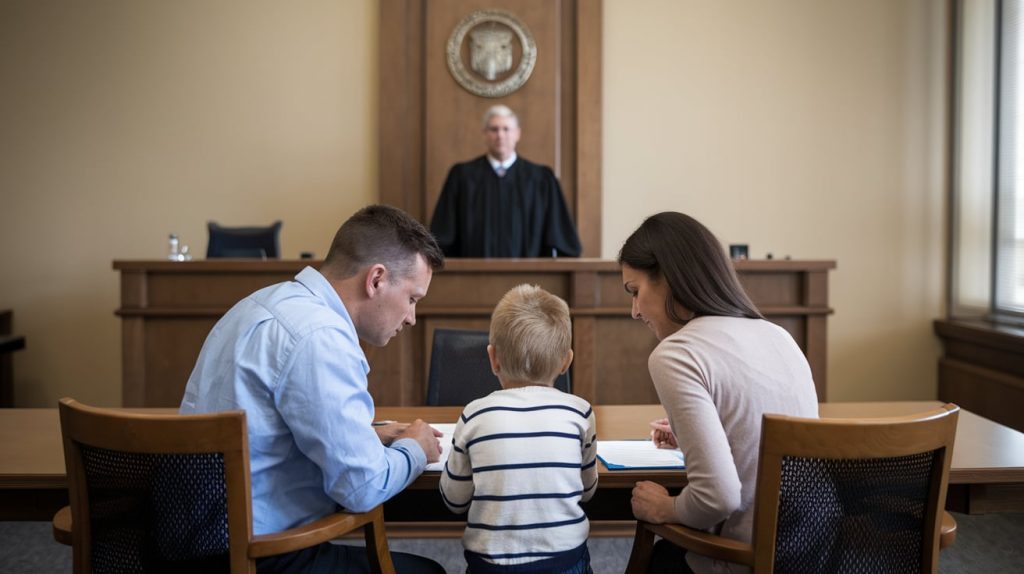Parents going through child custody matters often feel worried about the mediation process.
The process can be complex, and the outcome affects both the parents and their children. Many people wonder how to express their concerns clearly and stay focused during these important sessions.
Being ready for custody mediation helps create better results for everyone involved. Good planning can make a big difference in how well parents present their case and work toward solutions.
The right approach during mediation can lead to arrangements that work well for the children.
This blog will walk you through the key steps to getting ready for child custody mediation, the needs of the child, and a few things that you should avoid in custody mediation.
Importance of Child Custody Mediation

Child custody mediation stands out as a smart choice for parents who want the best for their children. The process saves both time and money compared to long court battles.
Most cases wrap up in a few meetings, keeping legal fees low and getting results faster than court fights. The real power of mediation comes from letting parents stay in charge of choices about their children.
Instead of having a judge make all the rules, parents work together to create plans that fit their family’s needs.
These plans work better because both parents understand and agree to them. Working together in mediation makes family life better going forward.
Parents learn to talk about problems in ways that help everyone. Children feel more secure when they see their parents working as a team.
They handle changes better and worry less about what comes next. Mediation also helps to keep family matters private, unlike court cases that become public records.
This privacy helps protect children from having others know about family changes. As parents talk through their plans, they learn ways to handle future problems too.
The plans that come from mediation tend to last longer because both parents helped create them. Each person knows what to do and why the rules matter. This leads to fewer fights later and helps parents work better as they raise their children.
Key Steps to Getting Ready for Child Custody Mediation
Getting ready for your mediation meeting takes careful planning.
Make a List of Your Children’s Needs and write down all the important parts of your children’s daily life. Include school times, after-school events, medical needs, and special care requirements.
Gather Important Papers
- School records and report cards
- Medical records and health insurance details
- Work schedule that shows when you can care for the kids
- Notes about special events or activities your children enjoy
Write Down Your Schedule
- Your work hours
- Time you spend with your children
- Your ability to take kids to school
- Times you can help with homework
- Weekend activities you do together
Plan Your Speaking Points
- How you support your children’s needs
- Ways you keep in touch with their teachers
- Your methods for handling daily care
- How you help with schoolwork
Keep Your Focus on the Children
- Stay calm when talking about plans
- Think about what works best for your kids
- Be ready to work with the other parent
- Keep all comments about the children’s needs
Getting ready for custody mediation takes time and attention to detail. Each step in your planning makes a real difference in how well you can present your case.
When you gather the right papers, make clear lists, and focus on your children’s needs, you build a strong base for the mediation talk.
Needs of the Child in Custody Mediation

When planning for custody, putting your child’s needs first makes all the difference. Each part of your child’s life needs careful thought and planning to keep them happy and healthy.
From basic daily care to emotional support, understanding these needs helps create better custody plans.
Let’s look at the key areas that are necessary for your child’s well-being.
1. Basic Care and Safety
Each home should meet your child’s daily needs with care. Keep your child’s bedroom ready with clean sheets, good lighting, and space for toys or study items.
Plan meals that give good food at set times. Make a list of safety steps like keeping medicines locked up and having fire plans. Show how you handle bath times, tooth brushing, and other daily care tasks.
Both parents should know about food likes, dislikes, and any allergies.
2. School and Learning
Keep track of your child’s classes and teachers. Show how you check homework and help with study time. Make a plan to attend school events and parent meetings.
Keep both parents in the loop about grades, test dates, and school projects. Talk about who helps with morning prep for school and after-school tasks. Share ways you support extra learning through reading time or study help.
3. Health and Medical Care
Keep a list of all doctors and their phone numbers. Share health records and shot dates with both parents. Write down any medicines your child takes and when they need them.
Make plans for handling sick days and who stays home from work. Both parents should know about checkup dates and dental visits. Keep track of health insurance cards and who carries the main plan.
4. Friends and Social Life
Know your child’s close friends and their parents’ contacts. Keep track of play dates and birthday parties coming up. Plan how both parents can help with sports teams or clubs.
Make sure both homes can host friends sometimes. Share the costs of social events and birthday gifts. Keep a list of which friends live near each parent’s home.
5. Emotional Support
Watch for signs your child feels sad or worried. Give time to talk without pushing too hard. Help them say what they feel without fear. Make sure they know both parents love them.
Find ways to make changes easier with set rules and times. Let them know it’s okay to love both parents. Think about getting help from child experts if needed.
6. Family Bonds
Plan regular times with grandparents, aunts, uncles, and cousins. Make sure holiday times include both family sides. Keep photos of all family members in both homes.
Help your child call or video chat with family when apart. Plan family events that work for everyone’s schedule. Make space for special family days or events.
Remember, each child has their own special needs. Your plan should fit your child’s age, likes, and daily life. The best plans grow and change as your child does.
Few Things to Avoid in Custody Mediation
- Speaking Badly About the Other Parent: Bad words about your child’s other parent can make you look mean. The mediator wants to see that you can work together as parents, not enemies.
- Making Quick Choices Alone: Moving to a new place or changing schools without talking first looks bad. These big choices need both parents to agree. Take time to talk about changes before you make them.
- Letting Feelings Take Over: When you get too mad or sad during talks, it gets hard to think well. You should stay calm and speak in a normal voice. You can take breaks if you need to cool down.
- Breaking Rules of the Meeting: Coming late or missing papers shows you don’t take things well. Follow all the rules the mediator gives. It is best to get there early with all your papers ready.
- Talking Only About Money: Fighting about who pays what takes focus away from the children. Save money talks for the right time. Keep mediation about making good plans for the kids.
- Using Your Child as a Message Carrier: Making your child tell things to the other parent puts them in the middle. Send messages straight to the other parent and keep your child out of the parent’s business.
- Not Listening to Others: Talking over people or not hearing their ideas makes things worse. Listen when others speak and think about what they say because good listening helps find better answers.
Conclusion
Getting through child custody mediation takes good planning and a calm mind. When you focus on your children’s needs and prepare well, you make the process work better for everyone.
Remember that mediation works best when both parents keep their children’s needs first. Your careful planning, clear parenting ideas, and respect for the process can lead to plans that work well for years to come.
Ready to start your mediation process? Take time to gather your papers, write down your plans, and think about what your children need most.
Small steps now make a big difference in creating good results for your family’s future.
Frequently Asked Questions
What is the Biggest Mistake in Custody Battle?
Speaking badly about the other parent is the worst mistake. It shows poor judgment and hurts your case. Courts want parents who can work together for their children.
Who is More Likely to Win a Custody Battle?
The parent who shows they can best care for the child keeps good records and works well with the other parent has better chances. Courts focus on the child’s needs.
Why is it so Hard for Fathers to Get Custody?
Old ideas about mothers being the main caregivers can affect some cases. But courts now look at each parent’s role, time with children, and ability to provide care.
What is the Best Evidence for Child Custody?
Records of your involvement in your child’s life work best. This includes school papers, doctor visit notes, daily care records, and proof of regular time spent together.








